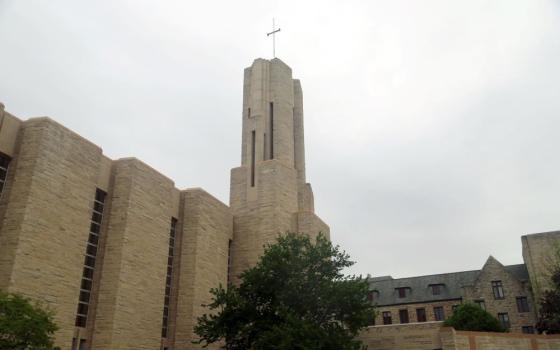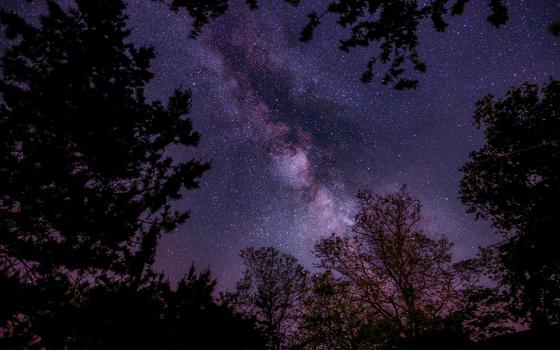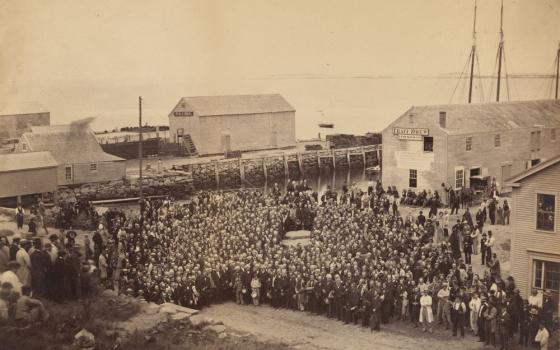Earlier this week, I came across something in one of the commentaries I was reading about the Scriptures for this Sunday -- a story about the great theologian, Avery Dulles. He died a few years ago, but published many, many articles and books well known throughout the world. At one time in his life, evidently he was under most serious attack, I guess you could call it, or he was being hounded in some ways by the Congregation for the Defense of the Faith.
They were challenging some of his writings and his theological approach to the teachings of the church, and evidently, he was kind of frustrated because during a talk he was giving, he said, “You know, it’s a good thing there was no Congregation for the Defense of the Faith, a holy office, in the beginning of the church. Otherwise, we would only have one gospel.” You see, what the Holy Office seems to do so often is to want every theologian, every scripture scholar, to teach precisely the theological slant or insight of the Holy Office.
|
Pentecost Sunday |
The theological truths in scriptures are too complicated in that there’s only one absolute way of hearing the scriptures or articulating the theological truths that God has revealed to us, and that’s so clear when we listen to today’s lessons. Look at the gospel lesson: It’s Easter Sunday night and Jesus appears to the disciples. The risen Jesus comes back to give them encouragement and strength and to know that, even though they failed him so miserably, they’re forgiven. They’re called now to spread that spirit of forgiveness throughout the world -- “As God sent me, I send you.”
On Easter Sunday night, Jesus breathed on them, gave them the Holy Spirit; it’s Pentecost, the event that we celebrate today. It was the coming of the Holy Spirit -- that’s what we celebrate -- but in Luke’s account as we hear in the Acts of the Apostles today, Pentecost is 50 days later, not Easter Sunday night. The giving of the Holy Spirit is an outpouring of the Holy Spirit that comes to the first disciples, not on Easter Sunday night, but 50 days later.
Are we going to reject what John says and accept what Luke says, or do we have to take what Luke says and reject John? There are so many ways in which God is being revealed to us that we can’t narrow it down to one particular way of speaking about God and God’s revelations. There’s a reason why Luke speaks in one way and John speaks in another and this happens in many things in the gospels where each gospel writer has his own purpose, a community from which he’s writing.
In John’s community, obviously the first thing that they were concerned about was to know that Jesus is alive, that he shared his spirit with them, and they are to be a loving, forgiving community. But Luke writing in the 80s evidently was at a point where the community was beginning to lose some of its fervor, so he put together a whole different scenario. He’s trying to get people to be aware that something dramatic, extraordinary has happened: God poured forth God’s spirit upon the world. It’s meant to change each of us and to change our world, to transform it, and so Luke creates this scenario.
Yet on the Feast of Pentecost, which the Jewish people were celebrating -- and this is a Jewish community, remember; the first Christians were all Jewish -- they, on Pentecost, were celebrating what happened at Sinai, the giving of the first covenant, where God says to Moses and to the people, “I am your God, you are my people.”
Remember how that first pouring forth of God’s spirit that brought about the first covenant happened? Moses saw the burning bush, so in Luke’s account we have the flames. It’s again a new time for the covenant to be understood and accepted and lived out. Also Luke goes further than just saying, “This is a new covenant” -- it’s a new creation. In the stories of creation in Genesis, you have the story of that mighty wind blowing over the chaos and drawing out of chaos the marvelous creation that includes our planet.
God was acting through the powerful wind to bring about creation. So now this powerful wind goes through the house; it’s a new creation. Going back to John’s gospel, where Jesus breathed upon them (Luke doesn’t include this in his account), it’s again part of a new creation. At the beginning, when God created human beings, God breathed on them and brought forth living creatures. God is breathing on us, bringing forth new creatures living, alive, vibrant.
There’s so much in these accounts of Pentecost, but especially Luke’s that we need to reflect upon, the pouring forth of the spirit upon the disciples at Easter or 50 days later. It almost certainly happened sooner than later, but as Luke describes it 50 days later, it’s intended to sort of shake us up and what has happened now, understand in a new, more powerful way. We are that new creation and we are the ones given the call to continue the work of Jesus -- “As God sent me, I send you.”
We might, I hope, be inspired by reflecting this way and to begin to understand that each of us needs to understand more deeply what pouring forth of God’s spirit upon us means for us individually, for our church, and then ultimately, as our church, we as a community of disciples of Jesus carry out the work of Jesus. What it means for the transformation of our world -- our world being transformed into the reign of God.
Well if we do begin to think this way, we might say, “Well, that’s way beyond me. I don’t see myself as one transforming the world. How am I able to do that?” Well, that’s where our second lesson becomes so important today. St. Paul, in writing to the church of Corinth, was reminding them they had received the Holy Spirit -- “You’re a community of disciples of Jesus and livened by his spirit.” The consequence of that is that each of them, as they’re inspired by the spirit, is filled with special gifts that enabled them first of all to recognize Jesus as Lord.
Paul’s telling them, “With respect to spiritual gifts, I remind you of the following: When you were still pagans, you were drawn to idols. Now I tell you that, inspired by the spirit of God, you are able to say, ‘Jesus is Lord. Only Jesus is Lord and God.’” You can’t do that except by the Holy Spirit; that’s what Paul is saying.
Then Paul says that’s not the only gift Jesus gives us through the spirit -- there’s a diversity of gifts. Even though the spirit is the same, there is diversity of ministries. Each of us is blessed with gifts and then called to service, to minister within the community and, as part of the community, to minister to the world. That can mean quite ordinary things in a way, but it can help bring about the transformation of the world.
Think of Pope Francis, the great example that he’s given to us already. On Holy Thursday going to the prison, acting as a servant, just as Jesus had said at the Last Supper when he washed his apostles’ feet, “As I have done for you, this is an example. So must you also do and do this in memory of me.” Just as we change the bread and wine into the body and blood of Christ in memory of Jesus, we begin to serve, and in even menial ways, as Pope Francis showed us, imitating Jesus. Wasn’t it beautiful the way Francis showed that when we reach out in ministry and serve others, we don’t exclude anyone?
Everyone is invited; on Holy Thursday, he washed the feet of young men and women. There was a rule against that, but obviously he’s saying, “No, our community in its service and its coming together has to be inclusive,” and so he washed the feet of women, but also Muslims. He’s showing us that now that we’re a new creation, a new community filled with the spirit, sent to do the work of Jesus, we must try to draw all people. As Jesus said, “When I am lifted up will draw all people to myself,” so we have to minister and use the gifts that we have to reach out to all; try to draw everybody together.
When we continue to look at Paul, it’s also going to bring about when we acted this way, where the Spirit living within us -- that as body as one has many members and all the members, while being many, form one body -- so does the Christ. All of us, whether Jews or Greeks, slaves or free, have been baptized in one spirit to form one body, and all of us have been given to drink from the one spirit. Part of the chrism of this Feast of Pentecost is that we’re drawn together more strongly through the spirit to be this one body of Jesus, carrying on his work in the world.
Finally, I think one of the important things that Jesus -- through this gift, the Feast of Pentecost -- is teaching us, is that it didn’t just happen a long time ago. No. Easter Sunday night the disciples received the Holy Spirit or as Luke describes as 50 days later, “The Holy Spirit is poured forth upon them.” The spirit continues to live in the church; the spirit continues to live now in our church, in each one of us.
One of the things we have to do is to be alert to the spirit, where the spirit is leading us today. Just as Luke described in his way of teaching about the about the outpouring of the Holy Spirit, emphasizing different works and a need for renewal in the church, so the same thing is true today.
Last week I gave confirmation at a parish where the parishes have been combined -- as so many have been combined in our diocese -- and one priest has two parishes. They’re both vibrant and active and significant in numbers, and he must celebrate the Holy Eucharist on the weekend seven times. If he has a funeral or a wedding on a Saturday, it’s even more. There is something wrong, don’t you think? Are we listening to the spirit or not? Would Jesus abandon us and no longer inspire us with how to confront a need for more ministers in the church?
If we really listen to what Paul says to the church in Corinth today, “All of you are gifted but with the spirit.” All of you have ministries -- all of us in the whole church. We have to try to bring about change in our church so that we’re a church who is listening to what the spirit is saying to us today as we confront new needs, different sets of circumstances, and our world, obviously, changes dramatically -- and now so quickly. So we, as a community of disciples of Jesus filled with his spirit -- and he’s still alive within us, not just 2,000 years ago -- if we listen, Jesus can guide us into a new way of being a church.
We have to, all of us, try to work together to make that happen, with our leaders in the church, but within our own parish family. We have to, all of us, try to come together and to listen to the spirit, to understand what specific gifts any of us, and all of us, have that will enable us to be a community of disciples of Jesus in the world as it is now. He is still present among us, within us, and if we listen, follow his guidance, we will be able to deal with the problems that confront us and become a new creation -- a new church filled once more with the Holy Spirit sent forth by Jesus to transform our world into the reign of God.
Isn’t that a great thing to celebrate, to think about, to reflect on -- how we can make this happen? I invite all of us now to continue to reflect on this beautiful Feast of Pentecost: what it meant at the beginning, what it means now, and how we’re going to fulfill what Jesus calls us to be, as his disciples, in this world of the 21st century.
[Bishop Gumbleton preached this homily at St. Leo, Detroit, Mich.]




